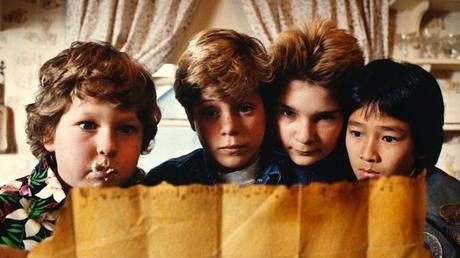Sloth, The Goonies, and '80s Inclusion
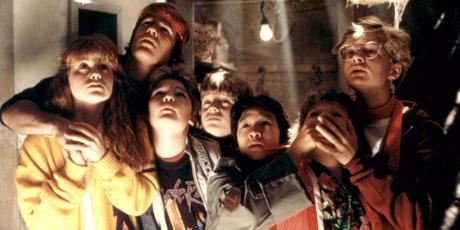
One of the welcome insights I've learned about cinema is that your perspective on a particular movie evolves and changes over time. A single twenty-year-old male who watches Arrival in 2016 is bound to have a much different reaction than that same person at forty, who has subsequently married, fathered a child, and lost a parent. Ace Ventura: Pet Detective may seem hilarious to a fifteen-year-old in 1993 only to come off horrifying in 2021 if that same person now has a transgender partner.
My personal "Aha!" moment came in the form of Ridley Scott's Blade Runner. I recall vividly watching the film and absolutely detesting it. I thought it was slow, plodding, gloomy, and lacking in action. Fast forward ten years when I once again watched the film in college and my perspective completely changed. I saw all the little nuances in a new light - the beauty of Jordan Cronenweth's cinematography, the deep examination of what it means to be human, Vangelis' haunting score, Rutger Hauer's heartbreaking turn as Roy Batty, and so much more. I realized that the film itself hadn't changed (OK technically it's gone through several cuts; shut up I'm making a point here) I had changed. Life experiences had made me see this film in a whole new light.
Over the last year, it has been my privilege to co-host a weekly movie podcast*. This week we decided to tackle one of my childhood favorites, Richard Donner's 1985 classic The Goonies. It had been at least fifteen years since I'd seen the film and I wondered if it would hold up. (Spoiler alert for you young readers out there, things change A LOT between twenty-seven and forty-two.) Much to my delight, I had a thoroughly enjoyable time revisiting Mikey, Mouth, Chunk, and the rest of the gang and going on their crazy Goonie adventure to find One-Eyed Willie's pirate treasure aboard the Inferno.
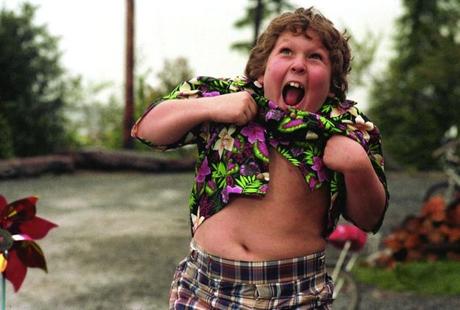
To my further delight, I noticed something this time around that my six-year-old self who saw it in the theater, my teenage self who watched it ad nauseam, and the cinema geek self who viewed it multiple times in my twenties, never picked up on before.
The Goonies is a fantastic example of otherly-abled inclusion. Specifically, I'm talking about the character of Lotney Fratelli also known as "Sloth," memorably played by the 6ft 8-inch ex-NFL player John Matuszak.
Now some of you at this point may be saying, "Whoa wait a truffle shuffle minute Corrye. How could the movie that chained this same character TO A WALL, be a shining inclusion example?"
Honestly, that's a fair point and the exact same reaction I had. Seeing a man who quite obviously has some mental development issues and is presented as a "monster" be chained to a wall - by his family no less - was jarring. Was liking The Goonies no longer acceptable? Was Woke Culture distorting my perceptions? Was I crazier than Ma Fratelli's outfit?
I told myself to relax, take a deep breath, and keep watching. I'm glad I did because what unfolded over the next hour and a half made me see The Goonies, Sloth's journey, and the dynamic between Sloth, Chunk, and the rest of the Goonies in a whole new light.
As he's presented at the outset, Sloth comes off as a terrifying monster. I mean he has to be right? If his own family is chaining him to a wall, he has to be pure evil right? Sean Astin's character of Mikey first encounters him alone and is subsequently taken out of the lighthouse restaurant by Brand screaming about a "giant It." Sloth at that point isn't even a person in Mikey's eyes. He's an "It." Minutes later when the rest of the Goonies are exposed to Sloth the reaction is pretty much the same. Dave Grusin's ominous score swells, Sloth roars, and the Goonies scream in terror. All of these examples tell the audience that Sloth is a terrifying goblin.
The Goonies reinforces this idea when Jeff Cohen's character of Chunk is subsequently locked in the same room as Sloth. Chunk introduces himself and again Sloth roars and Chunk responds in kind. And then....something amazing happens. Rather than terrorize Chunk he is in fact amused by him, laughing and bouncing around. They even find common ground when Chunk discovers Sloth likes chocolate and tries to toss his Baby Ruth to him. Chunk misses but the miss is the beginning of Sloth's liberation. Rather than suffer another injustice, Sloth channels his rage and literally breaks his own chains. His evolution has begun.
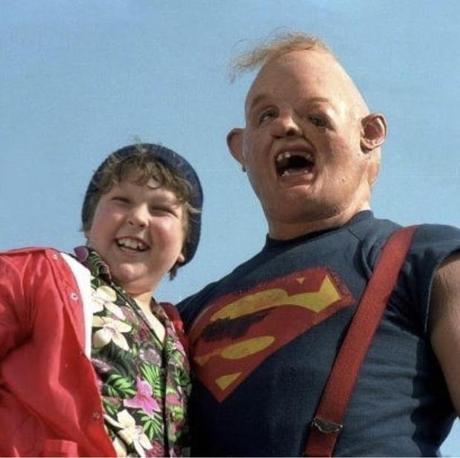
Not long after Chunk and Sloth introduce themselves to each other and Sloth - perhaps recognizing a kindred spirit - embraces Chunk and gives him a big wet kiss. It is at this moment where we observe a reverse Mary Shelley moment. Shelly's eponymous monster famously stated that "If I cannot inspire love I will cause fear." Here, Sloth decides to eschew that mindset and chooses to embrace love.
Sloth's full embrace of love moves Chunk. As the pair begin to follow the Goonies, Chunk serves as a calming influence, reassuring Sloth when his echo scares him and exhorting him not to be afraid of the dark. This spark ignites a fire when towards the end of the film Sloth, in a heroic gesture, swings along the Inferno and saves Andy and Stef. Sloth starts to believe that he is not the monster he's been taught he is, that he can in fact be heroic.
Even more incredible is how Sloth then resists being dragged down by his family again. The Fratellis are clearly a toxic clan and when Francis and Jake treat him like a child and try to tie him up, Sloth is having none of it. In fact, he rips open his outer shirt to reveal a Superman shirt underneath as John Williams' iconic score plays. An "S" for Sloth. Sloth no longer believes he can be a hero, he knows he is. Sloth isn't even swayed by the protestations of his mother, tossing her overboard and symbolically discarding his blood family.
Speaking of family, Sloth's transcendence reaches its pinnacle when he fully embraces his adopted family. In an act of selflessness, he holds the boulder just high enough for the Goonies to escape, knowing full well it might mean his death. And when the police try to lump him in with the rest of the Fratellis, the Goonies embrace Sloth, rightly pointing out who the bad guys are. At that moment, Sloth becomes one of the Goonies and is fully embraced by the people who less than twenty-fours ago were terrified of him. Not only has Sloth grown and evolved, but the Goonies have also as well. As corny and syrupy as it may sound, they collectively realize it's what's on the inside that counts. Hell, they've changed so much that Chunk wants to adopt him. While the proposition may strain credulity, I think the point is that his heart is in the right place.
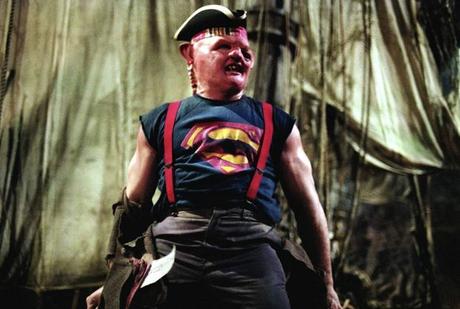
In the final analysis, The Goonies proves to be not some simple kids adventure story involving pirate treasure, but a well-meaning, compassionate, and empathetic tale of inclusion and acceptance.
Seeing as how 2020 too often presented society situations and circumstances that were completely lacking in compassion, empathy, and understanding, I think it's safe to say that we could all use a little more Sloth in our lives.
Also if you're interested, here is a shameless plug for my podcast called Movie Chumps: https://www.spreaker.com/show/movie-chumps